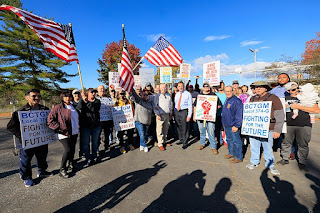As
is well-known due to recent calls for a boycott, Kellogg’s workers are on
strike. [1] The Bakery,
Confectionary, Tobacco Workers and Grain Millers International Union and the
company had been at the bargaining table for more than a year before the strike
was called.
Kellogg’s
and the union haven’t been on the best of terms for some time now. At the “Memphis
Kellogg’s plant…a lockout lasted 275 days in 2013 and into 2014. It ended when
a federal judge ordered Kellogg’s to allow employees back to work.” [2] In September of
this year, the “Kellogg Company announced plans to cut 212 jobs at its Battle
Creek plant over the next two years [3],” “including 174
positions represented by the union.” [4]
As
Dave Jamieson of Huffpost reported,
“The showdown at Kellogg’s revolves around a two-tier work system that the union says management is trying to expand at its plants in Michigan, Nebraska, Pennsylvania and Tennessee.
“Their
most recent contract created a class of ‘transitional’ employees who are paid
lower rates and have lesser benefits than ‘legacy’ employees. These newer
employees can graduate into the legacy system as more tenured workers retire or
quit, and the contract stipulates no more than 30% of the workforce can be ‘transitional.’
“But workers say Kellogg’s is seeking to eliminate that cap as they negotiate a new five-year contract. Doing so, they fear, would eventually leave all employees on the lower tier after legacy employees have moved on.
“Although pay rates vary by position, workers said there is currently a roughly
$12-per-hour difference between legacy employees and transitional employees in
many roles. The latter also pay health care costs that their legacy
counterparts don’t, and are on a lesser retirement plan.” [5]
Of
course. this won’t harm the workers who are already legacy employees. But what
we’re seeing here is labor solidarity, as against a transparent company attempt
to divide and conquer.
Yet
the company is trying to divide and conquer not just its employees, but also
Americans. It “posted a job advert seeking temporary workers to replace those
currently on strike at the company’s cereal production plants across the
country.” [6] As Alex Woodward
of Independent reported:
“Work
stoppages have ‘left us no choice but to hire permanent replacement employees
in positions vacated by striking workers,’ according to the company’s statement
on 7 December.
“Job
postings for those positions explicitly mention the strike.
“’The unions representing Kellogg employees in these plants are on strike, and we are looking for employees to permanently replace them, joining hundreds of Kellogg salaried employees, hourly employees, and contractors to keep the lines running,’ according to a job listing on the company’s website….
“On
10 December, President Joe Biden stepped into the debate, saying in a statement
that he is ‘deeply troubled by reports of Kellogg’s plans to permanently replace
striking workers’ from the union.
“’Permanently
replacing striking workers is an existential attack on the union and its
members’ jobs and livelihoods,’ he said in a statement. ‘I have long opposed
permanent striker replacements and I strongly support legislation that would
ban that practice.’ [7]
Indeed.
We await the specific legislation. There certainly should be such legislation,
because what is the point in a strike if the company can simply hire
replacements? And what is the point in a union if it’s ultimate weapon can be
so neutralized?
One
hopes that a bill will be forthcoming soon. As it stands now, workers “who
strike for economic gain may be permanently replaced by the employer…as long as
the replacement workers do not receive better terms than those offered to the
strikers.” [8] Can there be any
wonder why the United States suffers from such a wealth gap?
And
national solidarity means nothing to Kellogg’s either. Anthony Shelton,
president of the union has said that Kellogg’s “has threatened to send
additional jobs to Mexico if workers do not accept its proposals.”
For
those of us who remain unconvinced that labor negotiations should be a
one-sided affair, the Kellogg’s strike should make it clear, if anything does,
that protections for labor during negotiations should be stronger.
Hiring
replacement workers should be flat illegal, regardless of the reason for a
strike. Unless this is changed, unions won’t be able to effectively represent their
membership. The whole point of having unions in the first place is to equalize
the bargaining power between labor and management. But, as the law stands now, management
has a trump card, and can simply hire replacement workers who are more
compliant.
Secondly,
enough with American companies disembarking to other countries! That should be
against the law, and the threat to do it should also be against the law. More
than that, when a business puts a facility in a community, the community should
acquire a legally recognized interest, and firms should not be permitted to leave
the community any more than a city can move to another state or country.
These
measures have been common sense for a long time. Why haven’t we done it?
Finally, your humble servant is usually not much for boycotts, but here is an exception for the ages. Do not buy any Kellogg’s products until this strike is over!







